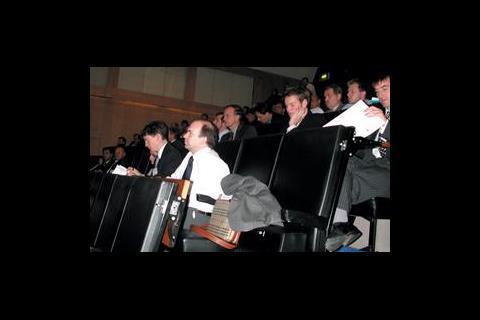The BRE held a conference recently at its headquarters in Hertfordshire to discuss the latest developments and thinking behind chp – focusing specifically on chp technology for the home, known as micro-chp.
The one day event attracted a great deal of attention from the services sector, who represented a large share of the 150 plus attendees. The conference was hosted by Micropower, producers of small-scale chp units, and was supported by CIBSE, the Institute of Energy, and the Institution of Civil Engineers.
Chaired by Lord Ezra, the speakers' list included government, financial and manufacturing professionals who all helped to provide what turned out to be an interesting and informative day.
The day began with Lord Ezra, chairman of Micropower, impressing on everyone the need to adopt a new attitude to energy production and to recognise the benefits of micro-chp: "A change is needed in the way electricity is generated – it should be nearer the point of consumption. There is a revolution in small-scale generation, it's going further than we thought. It is now reaching into the domestic market."
John Doddrell, director for the sustainable energy policy unit at the DTI noted the importance of the technology in the Government's energy policy. While Jeremy Eppel explained chp from the newly formed DEFRA's perspective. Both government representatives appeared positive about its benefits on the environment.
Notably, in a day of optimism, Jeremy Harrison of EA Technology offered a word of caution. He discussed the market potential in terms of how financially beneficial domestic chp would be for the end-user, believing that in smaller homes it would save money, but not in larger properties. He also highlighted the difficulties in convincing people that the high initial investment costs would be justified in the long-term.
The afternoon session saw David Strong, managing director of the BRE's energy division take over as chair. Afternoon speakers included Eoin Lees, chief executive of The Energy Saving Trust, who investigated the money saving potential for the householder, and also the dramatic effect large-scale micro-chp use would have on carbon emissions.
Also speaking were John Parsons of Advantica, Tom Gerson of Bowman, and Kofi Atuah of Johnson Matthey, who all discussed Micro-chp from the manufacturers' perspective.
The majority of the delegates considered the day a success. Julian Amey, chief executive of CIBSE attended the conference and explained: "CHP is a new and important area for services engineers, so this sort of event provides us with valuable information."
Steve Delvin of Hoare Lea added: "I thought the day was quite interesting with a lot of views being offered. The only thing that concerns me is that no-one really gave much away about installation – which I would like to have seen."
The Micropower conference put forward both positive and negative arguments. The conference was meant to promote micro-chp and so it was pleasing that the organisers allowed speakers to voice their opinions whether good or bad. It helped to provide the attendees with a good overall view of what will undoubtedly be an important new technology for the future.
The full list of speakers:
Lord Ezra, MicropowerDr David Strong, BRE
John Doddrell, DTI
Jeremy Eppel, DEFRA
Chris Hewett, IPPR
Jeremy Harrison, EA Technology
Dr John Curran, TXU Energi
Eddie Hyams, BizzEnergy
Anthony White, Citigroup
David Green, CHPA
Eoin Lees, Energy Saving Trust
Sean Sutcliffe, BG Group
Dr Jonathan Williams, ETSUM
John Parsons, Advantica
Tom Gerson, Bowman
Kofi Atuah, Johnson Matthey
Source
Building Sustainable Design
Postscript
Anyone wanting to know more about the conference, or contact details for any of the speakers should phone Kate Perry at BRE on 01923 664542, or e-mail perryk@bre.co.uk.























No comments yet